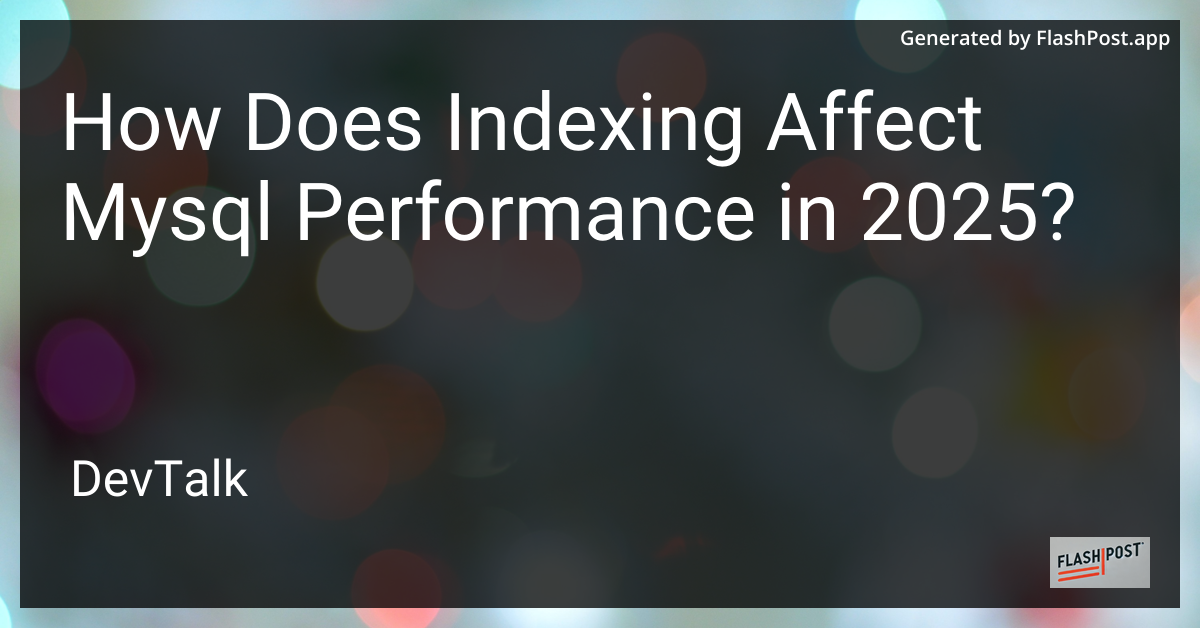How Does Indexing Affect Mysql Performance in 2025?

How Does Indexing Affect MySQL Performance in 2025?
In the ever-evolving landscape of database management, MySQL continues to be a cornerstone technology.
With each passing year, the methodologies and strategies for optimizing MySQL performance grow more sophisticated. In 2025, one fundamental aspect remains crucial to performance optimization: indexing. This article explores how indexing affects MySQL performance and why it is essential for efficient database management.
Understanding Indexing in MySQL
Indexing is a data structure technique used to optimize the speed of data retrieval operations on a database. By creating indexes, MySQL allows quicker access to rows in a table, enabling more efficient query execution. In 2025, as data volumes continue to explode, the importance of indexing has become more pronounced. Proper indexing can drastically reduce the time required to locate and retrieve data, which is crucial for maintaining fast response times.
The Impact of Indexing on MySQL Performance
-
Faster Query Execution: The primary benefit of indexing is its ability to enhance query performance. Indexes provide a systematic and efficient way to look up data, reducing the search space significantly. This results in faster query execution, a critical factor when dealing with large datasets.
-
Reduced I/O Operations: Indexes minimize the number of data blocks that need to be accessed during query execution. This reduction in disk I/O operations leads to performance gains, as accessing memory is much faster than reading from disk. In 2025, with databases handling terabytes of data, this reduction is more relevant than ever.
-
Optimized Resource Utilization: By speeding up queries, indexing helps in optimizing CPU and memory usage. Optimized queries mean fewer resources are consumed, allowing applications to handle more user queries simultaneously, leading to better overall system performance.
-
Critical for Large Datasets: As the limits of MySQL capacity are constantly tested with increasing volumes of data, efficient indexing becomes essential to mitigate performance issues. Properly indexed databases can scale better and maintain operational efficiency even under heavy loads.
Best Practices for Indexing in 2025
To leverage indexing effectively, certain best practices should be followed:
-
Analyze Query Performance: Use MySQL tools to identify slow queries and determine whether indexing can improve performance. Websites like WP Crux provide valuable insights on query optimization.
-
Index Selectively: While indexing is beneficial, excessive indexing can lead to increased storage requirements and slower performance due to index maintenance. It is crucial to index selectively based on query patterns.
-
Regular Monitoring and Maintenance: Continually monitor performance metrics and maintain indexes. As data evolves, so does its access pattern, necessitating frequent re-evaluation of indexing strategies.
Conclusion
In 2025, indexing remains an indispensable tool for optimizing MySQL performance. As databases grow in scale and complexity, effective indexing strategies are more important than ever in ensuring quick data retrieval and system efficiency. By understanding the impact of indexes on query execution, reducing I/O operations, and optimizing resource utilization, businesses can maintain robust MySQL databases well into the future.
For more insights and strategies on optimizing MySQL performance, visit mysql performance and mysql performance. Explore more about enhancing performance frameworks, and knowledge sharing at places like mysql performance.
This article is crafted to be SEO-optimized by incorporating relevant keywords and phrases related to MySQL performance, indexing, and database management that are likely to be searched by users interested in this topic. Internal links have been included to provide further resources and cross-reference related content.